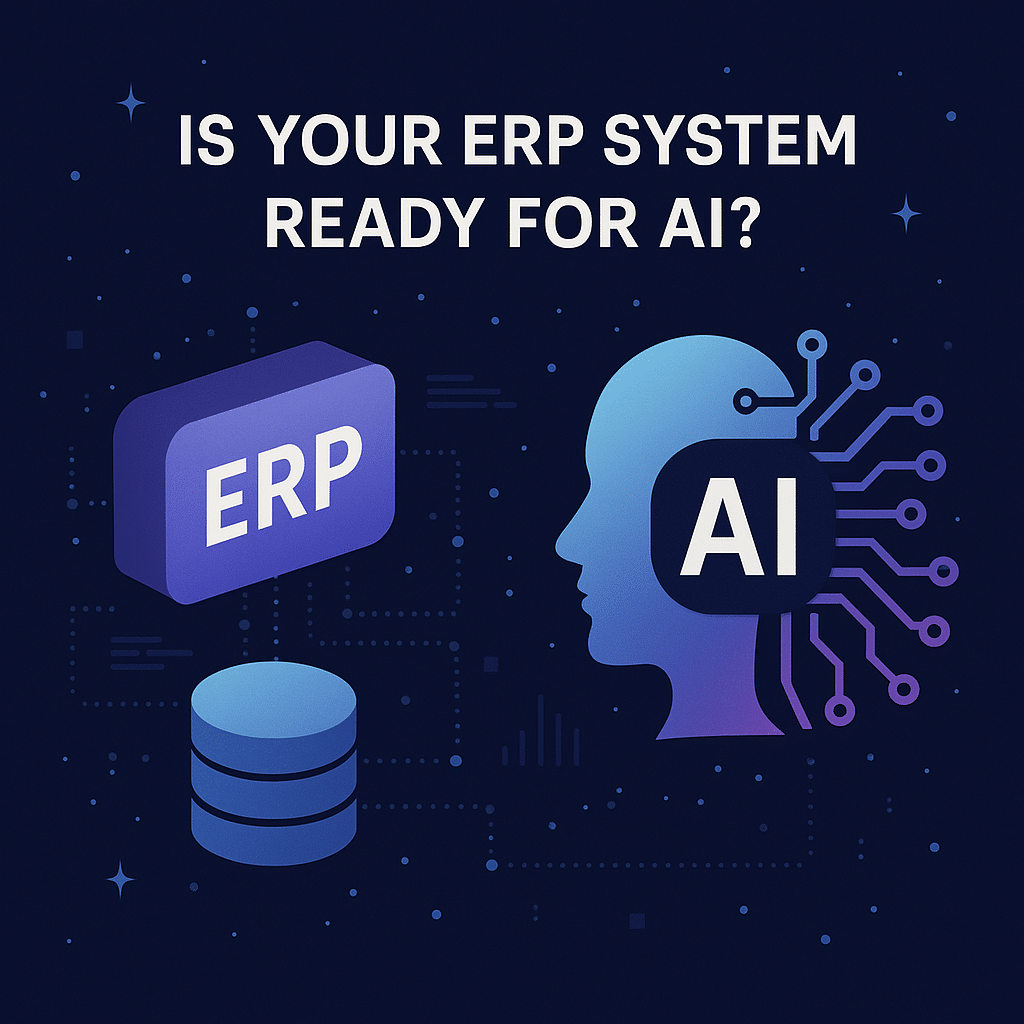Table of Contents
ToggleERP System Readiness for AI Starts with Data
When organizations ask if their ERP system is “ready for AI,” they’re usually asking the wrong question. AI is system agnostic. It doesn’t matter whether you’re running a modern cloud-based ERP or a 20-year-old on-prem solution. What matters most? Your data.
Before exploring AI capabilities, your first focus should be on data readiness. Is your organization consistently capturing clean, accurate, structured data? Are you centralizing that data across departments and systems? If not, even the most advanced AI won’t help you gain the insights you need. AI can’t optimize what it can’t understand.
Signals That Your Data Is AI-Ready:
- Centralized and integrated data repositories
- High-quality, structured datasets
- Real-time or near real-time data access
- Clean historical data for training AI models
- Clear governance and data ownership
Don’t Confuse Vendor Features with Organizational Needs
Many ERP vendors are investing heavily in embedded AI features—just like they did with cloud and SaaS. But the fact that your system offers predictive analytics or smart workflows doesn’t mean those are the right AI solutions for your business. The key is understanding your use cases.
Ask yourself:
- Do your current ERP AI features solve real business problems?
- Can you achieve faster time-to-value using native tools?
- Is your ERP touching the right data sources to feed an AI model?
- Are there competitive or operational advantages to building custom AI integrations?
In many cases, it’s faster (and smarter) to use what’s already available within your ERP. But for more advanced or unique AI goals, integrating external AI APIs may offer greater flexibility and innovation.
Think of AI as an API, Not Just a Tool
One way to simplify your approach is to think of AI as an API, not a magic add-on. In fact, many AI solutions today—from OpenAI’s tools to machine learning platforms—are simply integrations that connect to your existing systems via APIs.
This perspective opens up new opportunities:
- You can layer AI tools on top of your ERP system.
- You can feed AI models with external data sources (like weather patterns, economic indicators, or social media trends).
- You’re not locked into your vendor’s AI roadmap—you can create your own.
And with today’s tech, getting started is easier than ever. AI platforms often offer developer access and low-cost APIs that can be embedded into websites, platforms, and even ERP environments with minimal overhead.
Internal vs. External AI: Which Path Should You Take?
Choosing between native ERP AI and standalone AI integrations boils down to two things: speed and strategy.
If your vendor’s tools already address your pain points (e.g., invoice automation, predictive maintenance, or smart inventory), why reinvent the wheel?
But if you need to:
- Combine ERP data with non-ERP sources
- Build proprietary models for forecasting or optimization
- Achieve cross-functional AI use cases
- Push competitive advantages beyond “out-of-the-box” tools
… then a standalone AI solution may be the better path. Just be prepared for a heavier lift in terms of integration and strategy.
Metrics That Signal ERP AI Readiness
To make your AI roadmap real, look at both technical and organizational readiness. Here are key metrics and signals to assess before you implement AI:
Technical Readiness:
- Data cleanliness score (nulls, duplicates, consistency)
- Data integration maturity (number of siloed sources vs. integrated)
- API availability in your ERP system
- Cloud enablement and system accessibility
- Real-time data availability
Organizational Readiness:
- Executive alignment on AI priorities
- Clear use cases tied to business goals
- Resources for AI development (internal or external)
- Change management readiness
- Cybersecurity & compliance coverage
AI Success Isn’t a System Decision—It’s a Strategy Decision
Ultimately, AI success in the ERP world doesn’t come from picking the “right” software—it comes from crafting the right strategy. Whether you stick with vendor-provided AI tools or build your own integrations, your success depends on how well you:
- Define your use cases
- Prepare your data infrastructure
- Build an AI adoption roadmap
- Train your teams
- Execute across functions
ERP systems can be a powerful foundation—but they’re not the destination. AI can help you unlock new levels of productivity and insight, but only if you’re clear about what you want it to do, and why.
Need Help Building Your AI-Ready ERP Strategy?
Third Stage Consulting offers independent, vendor-agnostic support to help you evaluate AI opportunities, optimize your ERP data landscape, and build a realistic implementation roadmap. Whether you’re exploring embedded features or building custom models, our team can guide you through each step of your AI journey.
👉 Contact us today to learn how we can help make your ERP system AI-ready






